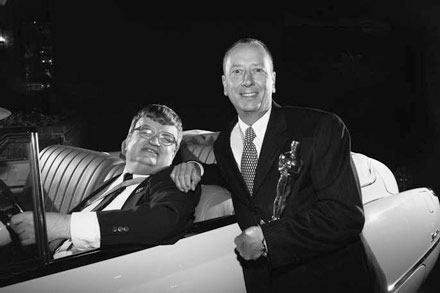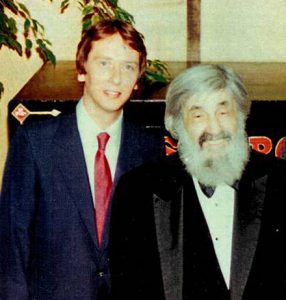
For Barry Morrow, what began as a selfless act of kindness grew into a sensational Hollywood career, one that included winning an Academy Award for Screenwriting for co-writing the movie “Rain Man,” starring Dustin Hoffman and Tom Cruise.
Morrow lived in Iowa for seven years, a period integral to his journey to Hollywood, for before “Rain Man” there was “Bill’s Story,” a TV movie Morrow wrote about his close friendship with a mildly mentally retarded, extraordinary man named Bill Sackter in Iowa City. The movie won several Emmy Awards.
Without Bill Sackter, there probably would be no “Rain Man.”
The story begins in 1977 in Minneapolis, a few miles from Morrow’s childhood home. Morrow had driven to Minikahda Country Club to pick up his wife Beverly at her job as a cocktail waitress, when he spotted a smiling figure waving to him from an upper floor window — Bill Sackter.

“That face, that beaming, innocent face,” Morrow recalls.
That face stuck with him. When Morrow met Bill at the club’s Christmas party, he learned that the handyman/dishwasher had spent 44 years in a mental institution. Morrow was touched. He befriended Bill. Soon he was including him in his life and family activities.
“Bill was childlike in his wonder,” recalls Morrow, now 65. “Hanging out with him was like being in Disneyland. He had an infectious way of finding people’s hearts.”
A year later, the friendship appeared to be in trouble when Morrow moved away to work a job as a video editor at the University of Iowa, 270 miles south. Six months later, he heard that Bill was to be institutionalized.
“I couldn’t let that happen,” recalls Morrow. He packed a bag and drove the family station wagon to Minneapolis and picked Bill up and brought him to Iowa.
At the time, Morrow and his wife and newborn son lived in a farmhouse in Richland, just south of Iowa City. Morrow became Bill’s legal guardian. He found Bill a room in a neighbor’s house and got him a job making coffee in a student lounge at UI’s School of Social Work.
Before long, people from all over Iowa City were stopping by for java and to experience the “one-man oasis” as one customer put it — the lovable proprietor of what would become Wild Bill’s Coffee Shop.
Bill rode the bus to town with his lunch box in hand and worked his coffee stand. He’d come a long way from the mental institution.
As for Morrow, he had a story to tell.
Watershed Moments
On a summer night in 1977, Morrow sat down at the typewriter. “I wanted to make sense of it,” he says. He excerpted the resulting 50-page story, which included facts he’d collected about Bill from legal documents and sent it to the Des Moines Register.

The newspaper published it, and Bill and Barry became the talk of the town. Iowa’s U.S. Senator John Culver republished the story in the Congressional Record. News spread far and wide. Bill was named Handicapped Iowan of the Year. The pair were invited to the White House where they visited President Carter.
CBS heard of the tale and contacted Morrow about making it into a TV movie. “Bill’s Story” aired in 1981 starring Mickey Rooney as Bill and a young Dennis Quaid as Morrow. Morrow won an Emmy for the teleplay. Rooney won one, too. In 1983, Morrow scripted a sequel, “Bill on His Own,” also starring Mickey Rooney, and Helen Hunt, which was well received.
Morrow became an advocate for the developmentally disabled and served on the board of the Association of Retarded Citizens (The ARC) and joined the National Association of Social Workers and the Autism Society of America. He and Bill won fame on the speaking circuit, attending events all over the country.
“He’d play his harmonica and I’d give a speech,” laughs Morrow.
Megasavant
When Bill died in 1983, Morrow continued his activism. At a convention of The ARC in 1984 he met Kim Peek, a rare megasavant. Kim was the man on whom Morrow would base the Dustin Hoffman character of “Rain Man.”
“I was blown away that such an individual could even exist,” says Morrow, who spent two exhilarating days with Kim and his father, Fran Peek, of Salt Lake City, witnessing Kim’s breathtaking feats of photographic recall, and bonding with him, as he had with Bill.
Kim, who was less autistic than what Hoffman played in the movie, could neither don his clothes nor brush his teeth without help, due to poor motor skills. What he could do was recite from memory vast tracts out of the telephone book, all of Shakespeare’s works, and the dates and even days of the week of just about every important event in history.
Kim could read a book in about an hour, recalling every word. He could even read the left- and right-hand pages of a book separately with each eye. Macrocephaly, a rare abnormality in which the brain’s two hemispheres are not synced up properly, made this possible.
Morrow wanted to write about Kim, but there was a problem. “A voice in my head kept saying, stop doing movies about the handicapped.” Morrow’s agent and Hollywood friends agreed, warning him he’d be pigeonholed and unable to find other kinds of work.
“I didn’t care,” says Morrow.
He just wasn’t sure how to approach it. Tapping the feel-good Bill formula again didn’t seem right.
He decided to turn the Bill strategy on its head. Rather than creating a kind, likable Barry Morrow-type protagonist to drive the story, he would invent the opposite—a selfish, unscrupulous cad. And so, the troubled, kinetic, gray-market Lamborghini dealer Charlie Babbitt, played by Tom Cruise, was born.

When Morrow accepted the Oscar for “Rain Man,” he handed it to Kim Peek, standing beside him. Kim would cherish the statuette for the rest of his life, keeping it close at hand, displaying it at the many onstage events at which he demonstrated his memory skills. Peek died in 2009 of a heart attack at the age of 58.
Character Arcs
Today, Morrow lives in Santa Barbara with his wife of 45 years, Beverly. Their son, Clay, is a director of animation at Disney Studios. Daughter Zoe is a school teacher. Clay and Zoe both live within an hour’s drive of their parents. Morrow continues to work as a writer and producer.
“I had no ambition to be a writer,” admits Morrow, who grew up the fourth child of six in a crowded home in St. Paul, Minnesota. “Being around all those kids, the way you got attention at the dinner table was telling a good story. I learned how to take a story and make it better.”
At his upcoming keynote address at the Iowa Motion Picture Awards ceremony on March 29, Morrow will share stories about his life and Hollywood career. He will also reveal a creative project he’s been working on secretly for nine years.
Looking back on his years in Iowa (1974-81), Morrow views them with warmth. “We had some of the best times of our lives here,” he says. “We had no money. The kids were small. We lived on a farm with chickens. We didn’t have a TV. Those times were wonderful.”
Iowa Motion Picture Awards: March 28-29, 2014, Capitol Theater, 211 N. 3rd St., Burlington. For more information or to register, visit www.impa.tv.
Contact writer:
info@warrengoldie.com
www.WarrenGoldie.com
